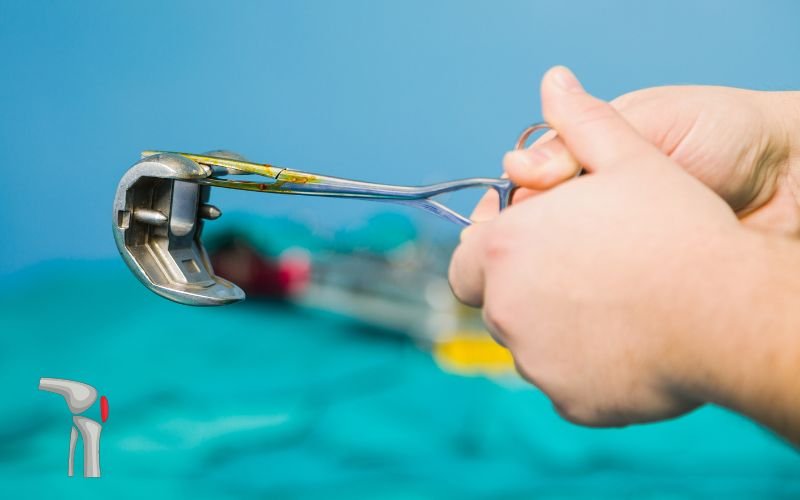If you are suffering from chronic knee pain, stiffness, inflammation of joints that restrict your daily movements, or degeneration of tissues that cannot be cured with physical therapy and medication, it is advised that you should go for a knee replacement surgery.
Knee replacement surgery is a surgery process where some part of the worn-out tissues or the whole knee is replaced. During knee replacement surgery, the damaged or worn-out knee is replaced by an artificial knee made out of metal or plastic.
What are Knee Implants?
Knee implants are prosthetic devices that are used in knee replacement surgery to replace the damaged or worn-out knee.
These devices are typically made of metal, plastic, alloy, and ceramic. Knee implants are used for both total knee, replacement surgery, and partial knee replacement surgery, depending on the type of damage. These implants function like natural knees and are helpful in restoring the flexibility and movement of the knees.
The things you should consider while choosing your knee implant or the material of the implant are as follows:
- The implants must be biocompatible, which means that they should be accepted by your body.
- The implants must be strong enough to bear the weight and flexible enough to make the moments easily without any restriction.
- The implants must be able to retain their shape and strength for a longer duration of time.
When do you need Knee Implants?
Some conditions where you need a kneecap surgery are as follows:
- If you are suffering from chronic knee pain, stiffness, and inflammation of joints that restricts your movement.
- When there is wear and tear of your joints due to ageing so, to fix the degenerative disc, you need a knee replacement surgery.
- If you are suffering from long-term and severe osteoarthritis that has reduced your mobility and inability to perform daily tasks.
- Any knee injury or trauma that has damaged your knees.
Types of Knee Replacement Surgeries
There are three primary types of knee replacement surgeries that the orthopaedic surgeon carries out, depending on your situation.
● Total knee replacement surgery
Total knee replacement surgery is the most common type of leg operation, where all the areas of the knee joints, like the medial (inside), lateral (outside), and patellofemoral (kneecap), are replaced with artificial implants. Tkr surgery is recommended for people who are suffering from chronic arthritis degeneration of tissues due to ageing.
● Partial Knee Replacement Surgery
Partial knee surgery or PKR is used to replace one or more than one part of the damaged knee. It is generally recommended for people who are suffering from early-age arthritis or trauma due to injury.
● Revision Knee Replacement Surgery
Revision knee replacement surgery is required to replace or repair the previously implanted artificial knee, as it gets worn out over a period of time.
Rkr surgery is required when there are complications with the previous implant, wear and tear of implants, the implants become loose, and there is infection.
Types of knee implants
The orthopaedic surgeon in Dwarka, Delhi selects the type of implant that has to be used during your surgery depending on factors like age, weight, level of damage, and quality of bone.
The different types of knee implants are as follows:
● Non-constrained Implants
Non-constraint implants are the type of implants where the lower and the upper parts are not connected with each other, and they are dependent on the knee ligament for stability and support. This type of knee implant provides more flexibility and the ability to move without restrictions. Non-constrained implants are generally suggested for patients who are suffering from osteoarthritis or less knee damage.
● Semi-constrained implants
Semi-constrained implants are generally used when the posterior cruciate ligament (PCL) is unstable and needs to be fixed. In this type of implant, the two components are connected together by using a hinge to provide stability, flexibility, and rigid support to the knees. These types of implants are generally used for partial knee replacement surgery, where a partial ligament is damaged, or a patient is suffering from knee deformities.
● Constrained Implants
Constrained implants are used when the knees are highly unstable. In this type of implant, the upper and the lower components are connected together using a hinge, which is attached to the bone using a long stem. Constrained implants provide extra support to the knees because the ligaments are fully damaged or too weak to function normally.
● Cemented Implants
Cemented implants are traditionally used for knee replacement surgery. In this type of implant, the implants are connected with the natural bone using a special type of adhesive or cement. This fills the gap between the implant and the damaged knee, ensuring stability and flexibility. These types of implants are generally used for elderly people who are suffering from wear and tear of bones and who have weaker bones.
● Non-Cemented implants
Unlike cemented plants, unlike cement, plants are made of rough and porous surface that allows the bone to grow over a period of time. Non-cemented implants are generally used when the knee joint is completely damaged or unable to function smoothly. Doctors generally prefer non-cemented implants for total knee replacement surgery, as they provide a strong base to the ligaments and add flexibility and stability to the bone, thus enhancing mobility.
If you are suffering from chronic joint pain, arthritis, or any trauma due to past injuries, you must go for a knee replacement surgery. The Bone Clinic is your one-stop solution for all the problems related to your damaged knees. They provide comprehensive support for the knee implant, according to your age, gender, and the type of damage.
Visit or call The Bone Clinic to enquire and get full information on your knee operation process.




